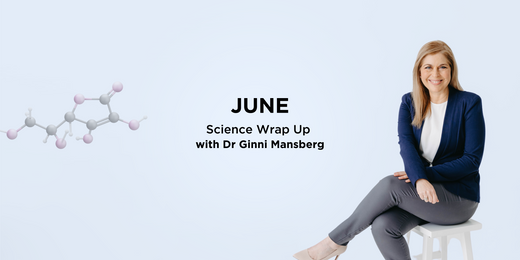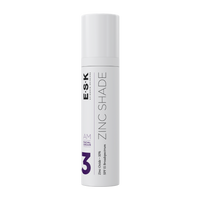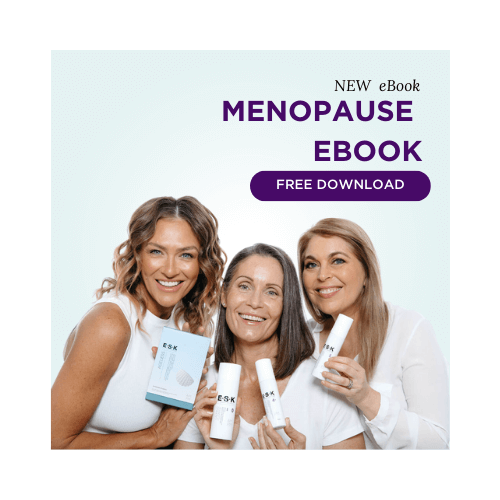
Science Hub
June 2024 Science Wrap Up
29 June 2024
Dr Ginni Mansberg
June is always a big month at ESK as we headed to the Gold Coast for the Non-Surgical Symposium of the Australian Society of Aesthetic Plastic Surgeons (aka ASAPS) annual scientific meeting. My talk on menopause and skin was really popular last year, so I was thrilled to be invited back again. This time there was a whole section of the conference dedicated to menopause and skin - progress!
The interest in the nexus of hormones and skin is so fascinating. And it’s not just menopause. Why do women get both acne breakouts and more sensitive skin before their periods? Why do teenage boys get more acne than teenage girls, but as adults, women get way more breakouts than men? Why is pregnancy such a roller coaster ride for the skin? I’ll keep reading and keep you posted.
Meanwhile here is my latest round-up of the studies for June…
Blue light and sunscreens
Bear with me while I explain this review article published in the Journal of Drugs and Dermatology. Here’s what we know - visible or blue light MIGHT be pro-aging. That’s why dermatologists warn against blue light LED masks that are touted for acne management. And with LEDs now replacing conventional light bulbs in many of our indoor spaces, not to mention an ever-increasing number of electronic devices near our faces, concerns about blue light exposure have become a hot topic of conversation. Whilst we now have good evidence that blue light doesn’t do anything bad to the retina (the light-detecting layer of cells at the back of our eyes), the authors point out we don’t have the same certainty about skin. The evidence so far tells us that with “typical” exposure, blue light doesn’t appear to be bad for the skin. But where does that leave you if you would prefer to play it safe and avoid blue light? Applying a daily physical sunscreen containing zinc oxide, for protection both indoors AND out, is probably your best shot.
What matters most to people when choosing a sunscreen?
The Journal of Drugs in Dermatology doubled down on its sunscreen research recently with a survey of 242 people in New York looking at the factors they look for when selecting a sunscreen. The average age of the respondents was 53.
First and foremost people want a high level of SPF (75% of respondents). I also found it fascinating that while ads for sunscreens featuring amazing branding, antioxidants, skin tone matching, and mineral formulations are super common, people care less about this than about actual efficacy and cosmetic feel. Something else that people look for is something extra - such as sunscreens that claim to both decrease the risk of skin cancer AND prevent premature aging. These “extras” were found to significantly boost sales, as does the recommendation of a dermatologist.
Seeing as SPF is the number one factor affecting which sunscreen people choose, let’s take a quick look at what SPF actually means. The SPF of a product refers to the multiple of time it would take you to burn with the product on compared to no product at all. For example, if it normally takes ten minutes for your skin to start burning, then properly applying SPF 15 would mean it would take 15 times longer, or 150 minutes, to start burning. Applying an SPF 30 sunscreen would take your skin 30 times longer, or 300 minutes to burn, and an SPF 50, 50 times longer, or 500 minutes.
Regardless of the SPF, your sunscreen still needs to be re-applied every two hours (or after swimming, exercising and towel drying) and used in combination with other sun protection measures like staying in the shade and wearing a hat, sun-protective clothing, and sunglasses to avoid burning.
Zinc Shade is your perfect daily sunscreen, formulated with zinc oxide for broad-spectrum UV protection. Unlike traditional chemical sunscreens, this mineral sunscreen deflects harmful UV rays rather than absorbing them, offering gentle, effective defence against both UVA (aging) and UVB (burning) rays. We spent countless iterations perfecting this lightweight, non-greasy formula to avoid the typical white cast and thick feel of zinc products. The results? A matte finish that works beautifully under makeup. With anti-inflammatory and antibacterial benefits, Zinc Shade also supports acne-prone and sensitive skin, like rosacea and eczema. It’s your ideal go-to for sun protection and skin health. Zinc Shade based daily cream providing you with the protection you need from both UVA (aging) and UVB (burning) rays. (Sunscreen with zinc)
Zinc Shade
Zinc Shade – UV Protection Skincare Product
Are we giving the right skincare info to all women when it comes to anti-aging strategies?
I was intrigued by a study published in the Journal of Clinical and Aesthetic Dermatology in which 1650 women between the ages of 17 and 70 in the US completed an online survey about the skin aging prevention advice they were getting. It was disappointing but not surprising that women of colour and older women felt the messages they were hearing weren’t for them. Ditto women who didn’t consider themselves flush with cash. What was interesting was that women rated info from a skin-care professional as the most trustworthy. Also, most women were doing absolutely nothing to protect their skin and prevent skin issues from melasma to aging!! Clearly, the advice we are giving is NOT getting through!
See you next month!

